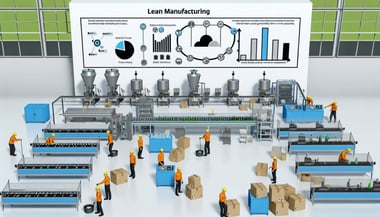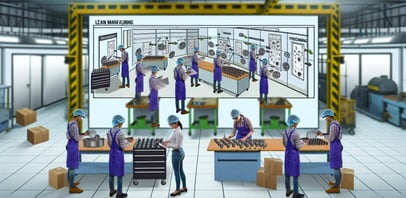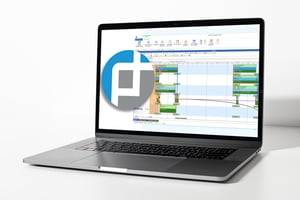Lean Manufacturing Principles for Efficient Planning
Supply chain managers are constantly seeking ways to optimize processes, minimize waste, and enhance productivity. At the heart of this pursuit lies lean manufacturing principles, a methodology that emphasizes continuous improvement and the elimination of non-value-added activities.
One crucial aspect of lean manufacturing is efficient planning. Effective planning ensures that resources are utilized optimally, production schedules are synchronized, and inventory levels are kept lean.
In this blog, we'll look into the significance of lean manufacturing principles in planning, and how integrating advanced planning and scheduling (APS) software like PlanetTogether with enterprise resource planning (ERP) systems can revolutionize planning processes in industrial manufacturing facilities.

Lean Manufacturing Principles
Before we look into the specifics of efficient planning, let's briefly recap the core principles of lean manufacturing:
Value Stream Mapping: Identifying and mapping out every step in the manufacturing process to eliminate waste and streamline value-added activities.
Just-in-Time (JIT) Production: Minimizing inventory levels by producing only what is needed, when it is needed, to avoid excess inventory costs and storage.
Continuous Improvement (Kaizen): Encouraging a culture of continuous improvement where employees at all levels are empowered to identify and implement enhancements to processes.
Pull Production: Using customer demand to drive production schedules, rather than pushing products through the manufacturing process based on forecasts.
Total Quality Management (TQM): Focusing on producing high-quality products consistently to minimize defects and rework.

Efficient Planning in Lean Manufacturing
In the context of lean manufacturing, efficient planning is essential for synchronizing production activities, minimizing lead times, and optimizing resource utilization. Here are some key strategies for efficient planning:
Demand-Driven Planning: Rather than relying solely on forecasts, demand-driven planning involves using real-time customer demand data to drive production schedules. This ensures that production is aligned with actual customer needs, minimizing the risk of overproduction or stockouts.
Optimized Production Scheduling: Effective production scheduling involves sequencing production activities in a way that minimizes changeovers, reduces idle time, and maximizes throughput. Advanced planning and scheduling (APS) software like PlanetTogether use algorithms to optimize production schedules based on various constraints and objectives.
Inventory Optimization: Lean manufacturing emphasizes maintaining minimal inventory levels to reduce carrying costs and minimize the risk of obsolescence. By leveraging APS software, supply chain managers can optimize inventory levels by synchronizing production with demand and minimizing excess stock.
Resource Utilization: Efficient planning also involves optimizing the utilization of resources such as manpower, machinery, and materials. By aligning production schedules with resource availability, manufacturers can minimize idle time and maximize efficiency.

Integrating PlanetTogether with ERP Systems
While lean manufacturing principles provide a framework for efficient planning, the implementation of these principles requires robust planning and scheduling tools. Integrating advanced planning and scheduling (APS) software like PlanetTogether with ERP systems can unlock a myriad of benefits for industrial manufacturing facilities:
Seamless Data Integration: Integrating PlanetTogether with ERP systems such as SAP, Oracle, Microsoft Dynamics, or Kinaxis allows for seamless data exchange between planning and execution systems. This ensures that production schedules are based on up-to-date inventory levels, customer orders, and resource availability.
Real-Time Visibility: By integrating APS software with ERP systems, supply chain managers gain real-time visibility into production schedules, inventory levels, and order status. This visibility enables proactive decision-making and rapid response to changes in demand or supply constraints.
Improved Decision-Making: The integration of APS with ERP systems provides supply chain managers with actionable insights and analytics for informed decision-making. By leveraging data analytics capabilities, manufacturers can identify trends, forecast demand more accurately, and optimize production plans accordingly.
Enhanced Collaboration: Integrated planning and scheduling systems facilitate collaboration and communication across departments. With a unified view of production schedules and resource allocations, teams can work together more effectively to resolve conflicts, prioritize orders, and meet customer demands.
Increased Efficiency and Productivity: Ultimately, the integration of APS software with ERP systems leads to increased efficiency, productivity, and agility in manufacturing operations. By automating planning and scheduling processes and eliminating manual interventions, manufacturers can reduce lead times, minimize costs, and enhance customer satisfaction.
Efficient planning lies at the heart of lean manufacturing principles, enabling industrial manufacturing facilities to optimize resources, minimize waste, and deliver value to customers. By integrating advanced planning and scheduling (APS) software like PlanetTogether with ERP systems, supply chain managers can unlock new levels of efficiency and agility in their planning processes.
The seamless integration of APS with ERP systems enables real-time visibility, improved decision-making, and enhanced collaboration across the organization. With optimized production schedules, inventory levels, and resource utilization, manufacturers can streamline operations, reduce costs, and gain a competitive edge in today's dynamic marketplace.
In the journey towards lean manufacturing excellence, efficient planning powered by advanced planning and scheduling technology is a critical enabler. Embracing this integration between PlanetTogether and ERP systems represents a significant step towards achieving operational excellence and driving sustainable growth in industrial manufacturing facilities.
Are you ready to take your manufacturing operations to the next level? Contact us today to learn more about how PlanetTogether can help you achieve your goals and drive success in your industry.


